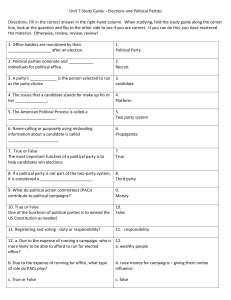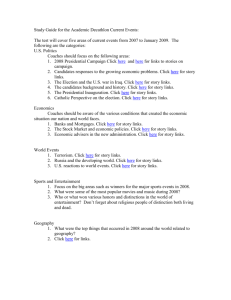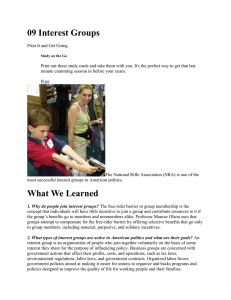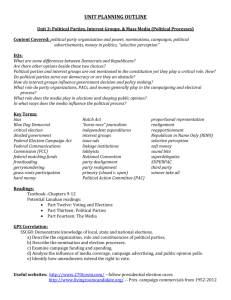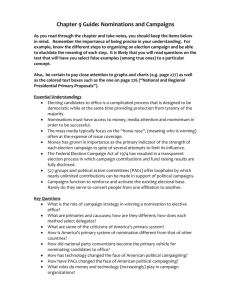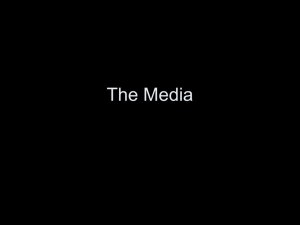Ch 9 - Nominations & Campaigns
advertisement
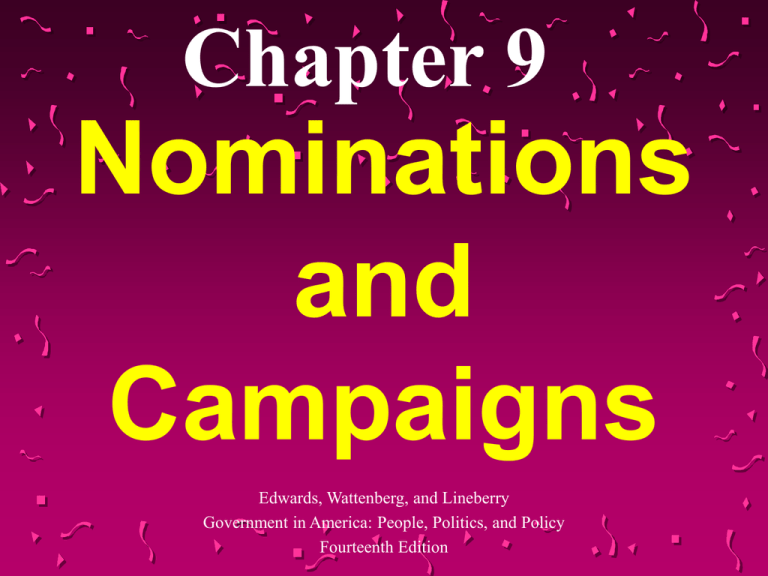
Chapter 9 Nominations and Campaigns Edwards, Wattenberg, and Lineberry Government in America: People, Politics, and Policy Fourteenth Edition Modern Campaigns Nomination The official endorsement of a candidate for office by a political party Generally, success requires Momentum, Money, and Media attention. Nature of Modern Campaigns TWO STEP PROCESS. Nomination campaign aimed at winning party support General election campaign aimed at winning office. CAMPAIGNS ARE NOW “PERSONALITY BASED” POLITICAL PARTIES HAVE LESS CONTROL OF CANDIDATE LOWER VOTER TURNOUTS FOCUS ON “LIKELY VOTERS” MAG CH 9 SUM CURRENT NOMINATION METHODS DIRECT PRIMARY CLOSED, OPEN, BLANKET PETITION PRESIDENTIAL PRIMARY NATIONAL CONVENTION DELEGATES ELECT MAG CH 9 SUM (AUSTRALIAN BALLOT) PUBLIC EXPENSE LIST ALL CANDIDATES GIVEN ONLY ONE @ POLLS SECRET VOTE • PRESIDENTIAL • NOMINATION •& • CAMPAIGN • PROCESS Deciding to Run Organizing a campaign Get a campaign manager Get a fund-raiser acampaign Hire media consultants Assemble staff and plan logistics Research /policy advisors, pollsters Get a good press secretary Campaign Organization Back Finding the Time American campaigns are long Winning delegates State primaries & caucuses “Frontloading” Iowa & New Hampshire 2012 Republican Candidates •Filed with the FEC, But on no primary ballots • • • • • • • • • • • • • Sarah Gonzalez (AZ) Paul Sims (AZ) Al Perry (AZ) Cesar Cisneros (AZ) Kevin Rubash (NH) Donald Benjamin (AZ) Michael Levinson (AZ) Kip Dean (AZ) Ronald Zack (AZ) Jeff Lawman (NH) Frank Lynch (AZ) Wayne Arnett (AZ) Raymond Perkins (AZ) • • • • • • • • • • • • • Matt Welch (AZ) Benjamin Linn (NH) Jim Terr (AZ) Charles Skelley (AZ) Simon Bollander (AZ) Joe Story (NH) Bear Betzler (NH) Joe Robinson (NH) Linden Swift (NH) Timothy Brewer (NH) Vern Wuensche (NH) Hugh Cort (NH) James Vestermark (NH) 2012 Republican Candidates •Filed with the FEC, But on 1 or 2 primary ballots • • • • • • • • John L. Davis (NH, TX) Michael J. Meehan (NH, MO) Mark Callahan (NH, AZ) Christopher Hill (NH, AZ) Randy Crow (NH, LA) Keith Drummond (NH, MO) Andy Martin (NH) Stewart Greenleaf (NH) 2012 Republican Candidates •Many Primary Ballots, but dropped out • • • • TIM PAWLENTY – AUG 14, 2011 THADDEUS MCCOTTER – SEP 22, 2011 HERMAIN CAIN – DEC 3, 2011 GARY JOHNSON - DEC 28, 2011 (Ran as Libertarian Party candidate) • • • • MICHELE BACHMAN - JAN 4, 2012 RICK PERRY – JAN 19, 2012 BUDDY ROEMER – FEB 22, 2012 RICK SANTORUM – APRIL 10-11, 2012 (Suspended, then withdrew, released delegates May 7, 2012) 2012 Republican Candidates •Many Primary Ballots, Never dropped out • RON PAUL • MITT ROMNEY (Won Nomination) The National Convention votes for the party’s presidential candidate Now are a formality, Less TV time. Key note speaker on the 1st day Party platform on the 2nd day Formal nomination of president and v-p candidates on 3rd & 4th days IS THE CURRENT NOMINATION PROCESS THE BEST WAY TO SELECT A PRESIDENTIAL CANDIDATE? 5 MINUTES / 50 WORDS CH 9 SUM MONEY “THE MOTHER’S MILK OF POLITICS” INDIVIDUAL DONATIONS POLITICAL ACTION COMMITTEES (PACs) Money and Campaigning Federal Election Campaign Act (1974) Created the Federal Election Commission (FEC) Created the Presidential Election Campaign Fund Partial public financing for presidential primaries Required full disclosure and limited contributions The Proliferation of PACs Political Action Committees (PACs) Groups that donate money to campaigns. Are registered with and monitored by the FEC. PACs contributed over $372.1 million to congressional candidates in 2006. PACs donate to candidates who support their issue. PACs do not “buy” candidates, but give to candidates who support them in the first place. Expenditures by PACs Back The McCain-Feingold Act (2002) Banned “soft” money, Increased amount of individual contributions Created 527 groups 527 Groups (SuperPACS) “Independent” groups that seek to influence political process that can spend unlimited money for a candidate or an issue. (SuperPACS) Were creatd by the Citizens United SCOTUS ruling (201o) Citizens United v F.E.C (2010) • 5-4 ruling (conservatives over liberals) • Freedom of Speech Protected • Money = speech • Buckley v. Valeo (1976) • Unlimited donations allowed • From independent (non-partisan) sources • Limited timely public disclosure 2012 “SuperPAC” top donations The Impact of Campaigns Campaigns have three effects on voters Reinforcement Activation Conversion The Impact of Campaigns Campaigns are limited because… Selective viewing / perception Party identification Incumbents CRITICAL OR REALIGNING PERIODS A LASTING SHIFT IN POPULAR COALITIONS 1800 - JEFFERSON’S D-R=FEDERALISTS FOLDED 1828 - JACKSONIAN DEMOCRATS IN POWER 1860 - LINCOLN REPS. REPLACE THE WHIGS 1896 - W.J. BRYANT DEMOCRATIC POPULISM 1932 - FDR NEW DEAL COALITION 1980 - THE REAGAN REVOLUTION ? CAN REALIGNMENT OCCUR WITH... WEAKER POLITICAL PARTIES? PERSONALITY ELECTIONS? MORE SPLIT TICKET VOTING? NO CRITICAL NATIONWIDE ISSUES? • Campaigns Lead to an Increased Scope of Government • Candidates make numerous promises, especially to state and local interests. Summary • Campaigns are media-oriented and time consuming. • Delegates are selected through caucuses and primaries. • Money is essential to campaigns. EXTRAS DECISIONS TO BE MADE EXTREME IDEOLOGICAL VIEWS FOR PRIMARY VOTES? OR MODERATE VIEWS FOR GENERAL ELECTION VOTES? NEGATIVE CAMPAIGN OR POSITIVE CAMPAIGN INSIDER OR OUTSIDER PERSONALITY WHAT GROUPS TO APPEAL TO WHAT APPEARANCES TO MAKE & WHERE TELEVISION IS VERY IMPORTANT PAID “SPOTS”, ADS NEWS “VISUALS” DEBATES CONVENTIONS ARE LESS IMPORTANT “RED MEAT” FOR BASE OUTREACH FOR MODERATES POLITICAL CAMPAIGNS COST $$$$ WHOEVER SPENDS THE MOST, USUALLY (74%) WINS LARGE “MONEY ADVANTAGE” HELPS CHALLENGERS MORE THAN INCUMBENTS WHERE DOES CAMPAIGN MONEY COME FROM? 1-CANDIDATES THEMSELVES 2-THE WEALTHY $2,000 MAX PER CANDIDATE 3-ORGANIZATIONS, INTEREST GROUPS & P.A.C.s $5,000 MAX PER CANDIDATE (???) 4-SMALL INDIVIDUAL DONORS MOST MONEY COMES FROM HERE 5-THE FEDERAL GOVERNMENT PRESIDENTIAL PRIMARIES/ELECTIONS ONLY 2008 Election Analysis Obama made gains in South and West. Voter turnout was as high as it had been since 1964. Obama’s choice not to use public financing helped him. African Americans and women were keys for Obama. 2008 Contribution Limits An individual can give up to: $2,000 per election to any candidate or candidate committee $25,000 per calendar year to a national party committee $10,000 per calendar year to each state or local party committee $5,000 per calendar year to a Political Action Committee (PAC) $95,000 per two-year election cycle to candidates, national party committees and PACs 1972 CAMPAIGN REFORM HELPED… WEALTHY CANDIDATES THOSE WHO APPEAL TO MANY PEOPLE INCUMBENTS EARLY CAMPAIGNERS CELEBRITIES POLITIC ACTION COMMITTEES 2000 ELECTION REFORMS LIMIT “SOFT MONEY” 527 GROUPS CREATED “swift boat” groups GERRYMANDERING • THE INTENTIONAL REALIGNMENT OF DISTRICTS TO FAVOR ONE POLITICAL PARTY GERRYMANDERING (legal) MINORITY-MAJORITY DISTRICTS (unconstitutional) 2009 ELECTION CYCLE KEY STATE RESULTS • NEW REPUBLICAN GOVERNORS • VIRGINIA & NEW JERSEY • AFFLUENT SUBURBANITES – BIG REP GAINS • DEMOCRATIC FED.HOUSE SEAT • NE NEW YORK (NY-23) • REPUBLICAN SPLIT (MOD. VS CONS.) • MAINE VOTES NO ON GAY MARRIAGE • REFERENDUM AGAINST LAW PASSED • OHIO VOTES YES TO CASINOS ELECTIONS & CAMPAIGNS OBJECTIVES 1-DEMONSTRATE THE DIFFERENCES BETWEEN THE PARTYORIENTED CAMPAIGNS OF THE NINETEENTH CENTURY AND THE CANDIDATE-ORIENTED CAMPAIGNS OF TODAY. 2-EXPLAIN THE MAJOR ELEMENTS OF A SUCCESSFUL CAMPAIGN FOR OFFICE TODAY. ELECTIONS & CAMPAIGNS OBJECTIVES 3-DISCUSS HOW IMPORTANT CAMPAIGN FUNDING IS TO ELECTION OUTCOMES. 4-DEFINE THE TERM REALIGNING ELECTION AND DISCUSS THE MAJOR EXAMPLES OF SUCH ELECTIONS IN THE PAST. ALSO ADDRESS THE CONCERN OVER WHETHER REALIGNMENT IS AGAIN UNDERWAY. ELECTIONS & CAMPAIGNS OBJECTIVES 5-DESCRIBE WHAT THE DEMOCRATS AND REPUBLICANS EACH MUST DO TO PUT TOGETHER A SUCCESSFUL NATIONAL COALITION TO WIN ELECTIONS. 6-DO ELECTIONS RESULT IN MAJOR CHANGES IN PUBLIC POLICY IN THE UNITED STATES? ELECTIONS & CAMPAIGNS IMPORTANT TERMS BLANKET PRIMARY CLOSED PRIMARY COATTAILS (POLITICAL) CRITICAL (REALIGNING) PERIODS DIRECT MAIL GENERAL ELECTION INCUMBENT INDEPENDENT OFFICE-BLOC BALLOT OPEN PRIMARY PARTY-COLUMN BALLOT ELECTIONS & CAMPAIGNS IMPORTANT TERMS POLITICAL ACTION COMMITTEE (PAC) POSITION ISSUE PRESIDENTIAL PRIMARY PRIMARY ELECTION PROSPECTING VOTING RETROSPECTIVE VOTING RUNOFF PRIMARY SPLIT-TICKET VOTING STRAIGHT-TICKET VOTING VALENCE ISSUE VISUAL
